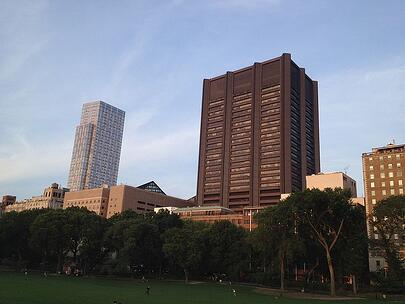
Fighting cancer is a battle that milions of people have had to, or are currently, waging. When surgeons are unable to remove cancerous tumors, radiation treatment (radiotherapy) is used to destroy the tumors. However, many times, radiation treatments fail to destroy the entirety of the tumor, leaving cancerous cells in the body. Researchers at the Ichan School of Medicine at Mt. Sinai in New York have discovered why radiotherapy is not always successful.
Through their research, the Mt. Sinai team found that when skin harboring tumors are damaged by radiotherapy, Langerhans - skin immune cells - are activated and begin to repair their own DNA that the radiotherapy damaged. Through this reparation process, the Langerhans cells can not only become resistant to radiotherapy, but can also cause some tumors, like melanoma, to become resistant to further radiation treatment.
|
RELATED ARTICLES: Emory Researchers Find Anti-Cancer Potential in Lichens and Rhubarb $650M Expansion to Benefit Memorial Hermann-Texas Medical Center |
With this knowledge of Langerhans, the New York researchers used mouse models of melanoma and focused their study on the skin where these cells are located. In their research, the team used immunotherapy drugs to boost the immune system in attacking tumors, effectively blocking Langerhans from repairing their own DNA after radiation treatments. This caused the Langerhans to die while preventing a response from immune cells to protect skin tumors.
Lead author of the study and Immunologist, Jeremy Price, Ph.D. explains "our study suggests that this combination approach — combining radiotherapy with drugs that rev up a healthy immune response — will help make radiation therapy much more effective.”
Furthermore, the researchers learned that Langerhans cells move to lymph nodes to communicate with nearby immune cells while also programming "regulatory" T cells that weaken the immune system. These T cells then move back to the tumor and protect it from being attacked by the immune system.
“Any treatment that prevents tumor infiltrating regulatory T cells from being produced, such as immunotherapy, will improve the outcome from radiation treatment — and that will save lives,” Dr. Price said.


The Icahn School of Medicine at Mount Sinai is a multi-million dollar life science research marketplace that receives many grants, awards, and donations to help fund many of the institutions ongoing research projects. In the 2013 fiscal year, the total R&D expenditures of the university exceeded $428 million, and in the 2014 fiscal year the institution received more than $240.5 million from the NIH.
Research benefiting from this funding includes:
- $10 million has been committed to the Jaffe Food Allergy Institute at The Mount Sinai Medical Center which will create the David H. and Julia Koch Research Program.
- The Brain Injury Research Center at Mount Sinai received grants totaling $6.65 million over a five year period to research traumatic brain injury.
- Mt. Sinai researchers received a 5-year $6 million NIH grant to lead a consortium studying autism and intellectual disability.
Laboratory suppliers interested in marketing lab supplies to active researchers at the Icahn School of Medicine at Mount Sinai are encouraged to participate in the 11th Annual BioResearch Product Faire™ Event at Mount Sinai where 200+ active life science researchers are expected to attend to discover new products and tools to use in their labs. For more information about exhibiting at Mount Sinai on March 23, 2016, please visit the link below:


